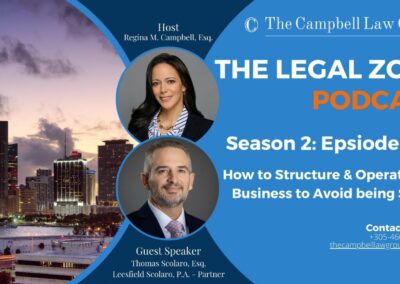Litigating civil theft cases can be a daunting and complex process for any business. Such cases can be stressful and time-consuming, taking a toll on a company’s resources and reputation. In addition, false accusations of civil theft can cause significant harm to a business, both in terms of public perception and financial stability.
Civil theft litigation can arise from various criminal activities, including theft, possession of altered property, dealing in stolen property, and exploitation of an elderly person. Florida’s civil theft statute, Fla. Stat. § 772.11, creates civil liability for such criminal practices. However, in order to pursue a civil theft claim, the criminal act must violate specific sections of the Florida Statutes, and the plaintiff must present clear and convincing evidence to establish the allegations.
False accusations of civil theft can also have severe consequences for a business, even if the accusations are ultimately proven to be untrue. Such accusations can harm a company’s reputation and cause long-term damage to its brand. In addition, businesses facing false accusations may be forced to expend significant resources to defend themselves against baseless claims. These resources could be better allocated toward other critical business operations.
Civil theft litigation and false accusations of civil theft can have serious implications for businesses, both in terms of their reputation and financial stability. Therefore, it is essential to seek legal guidance and representation from experienced professionals who can navigate the complexities of civil theft cases and protect a business’s interests.
The Campbell Law Group specializes in complex business litigation and has extensive experience litigating civil theft cases. With a deep understanding of the intricacies of Florida’s civil theft statute, the firm can provide strategic counsel and representation to help businesses protect their rights and prevent future legal issues.
Examples of Civil Theft in Florida
For Florida businesses, civil theft can take on various forms that can result in significant harm to a company’s financial and reputational well-being. Here are some examples of civil theft that businesses should be aware of:
- Employee theft: This involves employees taking company property or assets for their own use without permission or authority to do so.
- Embezzlement: This is a type of theft where employees use company funds or assets for their own benefit, often by falsifying records to hide their actions.
- Fraud: Making false representations to obtain property or money from a company, such as forging invoices or other documents to obtain payments.
- Breach of contract: This occurs when a party fails to fulfill contractual obligations, such as not delivering goods or services as agreed upon.
- Intellectual property theft: This involves the unauthorized use of a company’s intellectual property, such as trademarks, patents, or trade secrets, which can cause significant financial harm to the company.
- Misappropriation of funds: Using company funds for personal use, such as taking cash from the register or using company credit cards for personal expenses, is considered theft and can result in civil liability.
- Conversion: This occurs when someone takes possession of a company’s property without permission and uses it as their own.
- Extortion: This is the act of threatening a company to obtain property or money, which can result in serious legal and financial consequences.
- Unjust enrichment: Taking advantage of a business relationship or transaction to gain something for oneself without providing adequate compensation is considered theft under Florida law.
- Breach of fiduciary duty: This occurs when someone in a position of trust, such as a director or officer, uses their position to benefit themselves at the expense of the company, which can result in significant harm to the company.
Businesses in Florida should be vigilant in protecting themselves against civil theft and take immediate action if they suspect any form of theft has occurred. It is advisable to consult with a legal professional who can help businesses navigate the complexities of civil theft litigation and protect their legal and financial interests.
Get the Legal Support You Need for Civil Theft Litigation with The Campbell Law Group
It is crucial to have an experienced legal team by your side when filing or responding to a lawsuit. At The Campbell Law Group, we have several years of experience representing clients in civil theft cases. Our team will work with you to determine the extent of your losses and conduct thorough investigations to prepare the strongest possible case.
Our law offices are dedicated to resolving disputes as efficiently as possible, and we will make every effort to settle the case out of court. However, if a trial is necessary, we have the expertise and resources to handle your case effectively.
If you are facing litigation, do not hesitate to contact The Campbell Law Group and schedule an Initial Consultation. We will discuss your concerns and develop a personalized strategy to achieve the best possible outcome for your case.
Frequently Asked Question
What elements must be established in a civil theft action?
To establish a prima facie case for civil theft in Florida, the plaintiff must allege that the defendant knowingly obtained or used their property with felonious intent and did so to deprive the plaintiff of their right to or a benefit from the property. Felonious intent refers to the conscious intent to steal what does not belong to the taker.
Florida also requires that a person, ‘[b]efore filing an action under this section’ seeking treble damages for civil theft ‘must make a written demand for payment,’ and provides that if the person to whom the written demand is made complies within thirty days after receiving the demand, ‘that person shall be given a written release from further civil liability’ by the person making the demand. Should the person receiving the demand refuse or fail to return money or property alleged stolen in the letter within the thirty (30) days, then the person who making the damage is entitled to tremble the amount of the original amount alleged stolen in the demand.
What steps must be taken before filing a civil theft lawsuit?
Before filing a lawsuit, the person claiming injury must make a written demand for the value of the stolen property or for the return of the specific property taken. If the person to whom the demand is made complies with the demand within 30 days, they shall be given a written release indicating that they are absolved from any further civil liability.
What damages are available in a civil theft action?
If a plaintiff succeeds in a civil theft action, they are entitled to treble (triple) the amount of the value of the stolen property, as well as reasonable attorney’s fees and court costs. However, punitive damages are not available under the civil theft statute.
What is considered “clear and convincing evidence” in a civil theft case?
Clear and convincing evidence is the burden of proof required for a civil theft claim to be determined by a judge or jury. It is a less rigorous burden of proof than beyond a reasonable doubt and a higher standard of proof than preponderance of the evidence.
What should you do if you are facing civil theft litigation?
It is important to consult with experienced legal counsel who can guide you through the legal process and protect your rights. A qualified attorney can help you determine the best strategy for your case, whether it involves settling out of court or going to trial.















